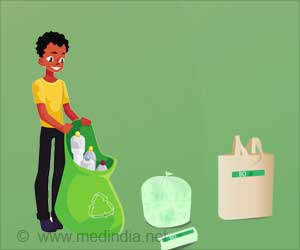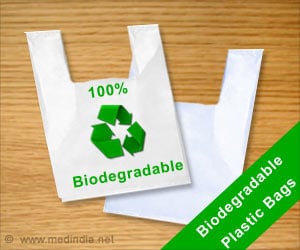Highlights:
- Scientists design a recyclable plastic that can be broken down and rebuilt into another plastic item of different shape, color, size or texture that can be used for a different purpose, while retaining its properties
- Newly developed PDK poly(diketoenamine) plastic polymer can be broken down just by immersing the plastic in a highly acidic solution, enabling its reuse/recycling and thus preventing plastic pollution hazard
- Increased use of plastic poses a major environmental hazard as it takes several hundred years to degrade and pollutes the ecosystem including water bodies and also puts pressure on the local administration to handle this plastic waste
Conventional plastics cannot be recycled and hence, termed as linear plastics. PDK plastic which can be reused and recycled is termed circular plastic.
"Most plastics were never made to be recycled," said lead author Peter Christensen, a postdoctoral researcher at Berkeley Lab's Molecular Foundry. "But we have discovered a new way to assemble plastics that takes recycling into consideration from a molecular perspective."
Read More..
Accidental Discovery of Circular PDK poly(diketoenamine) Plastic Polymer
- Just like many discoveries, the unique properties of PDK plastic polymer were discovered accidentally
- The team noticed the potential of PDK-based plastics when one of the scientists was adding various acids to glassware used to make PDK adhesives, and found that the adhesive's composition had been altered
- Keen to determine how the adhesive’s composition had changed, the team looked at the adhesive’s molecular structure with an NMR (nuclear magnetic resonance) spectroscopic device, and found that the adhesive polymer had been broken down into its individual monomers
- On further testing at the Molecular Foundry, they showed that the acid breaks down PDK polymers into monomers, while at the same time allowing these monomers to also be separated from chemicals added to give the plastic its strong, stretchy and flexible properties
- The team found that the resulting PDK monomers could be once again rebuilt into polymers, which can then be used to make new plastic materials of a different color, form or texture. For example, an old damaged black watchband made of PDK plastic could be transformed into a white computer keyboard by this recycling
- The old plastic could also be upcycled by adding chemicals to enhance its properties and to make a newer and better plastic material
Why is PDK Plastic Recyclable?
In contrast to conventional plastic, the bonds of PDK plastics are made up of reversible bonds that enable easier breakdown and recycling on treating with acid. The findings of the study do suggest that PDK plastic could be a game changer in the plastic industry and might be a potential solution to make plastic recyclable and save the eco-system."We're interested in the chemistry that redirects plastic lifecycles from linear to circular," said Helms one of the team members. "We see an opportunity to make a difference for where there are no recycling options such as adhesives, phone cases, shoes, watch straps, computer cables, and hard thermosets made by shaping hot melted plastic material.”
Disadvantages of Conventional Non-Recyclable Plastics
- Plastics are polymers made of repeating smaller carbon containing units called monomers
- Several chemicals are added to the basic plastic polymer to obtain desirable properties such as toughness, flexibility, stretchability and lightness of weight
- These chemicals remain tightly attached to the plastic monomers even after being broken down in a recycling center
- The mixture that goes into the recycling plant thus contains a mixture of various types of plastic in different forms, shapes, color and sizes
- The resulting output consists of small pieces of plastic that are melted to make a new material, and it is not easy to predict how different the properties of this recycled product is from the original plastic, thereby preventive effective recycling
- Interestingly, even the most recyclable plastic, PET - or poly(ethylene terephthalate) can only be recycled up to 30 percent, and the remainder goes to landfills or incinerators, where the material takes hundreds of years to decompose, posing a major threat to the environment
Future Study Plans & Suggestions
- PDK plastic could replace conventional plastic in several areas
- Team plans to develop PDK plastics with varying physical and thermal properties for diverse applications including using in textiles, foams and 3D printing
- The team hope to develop plant-based formulations and use sustainable resources that are eco-friendly
- There is a need to develop facilities with infrastructure to recycle PDK plastics
Newly developed PDK plastic can be completely recycled and reused to make other plastic products and is a breakthrough in protecting the earth from plastic pollution.
References:
- Plastic Gets a Do-Over: Breakthrough Discovery Recycles Plastic From the Inside Out - (https://newscenter.lbl.gov/2019/05/06/recycling-plastic-from-the-inside-out/)
Source-Medindia










